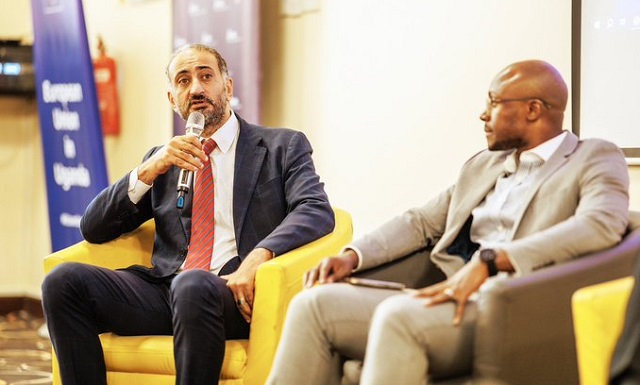
Kampala, Uganda | Patricia Akankwatsa | The International Fund for Agricultural Development (IFAD) convened a high-level workshop on alternative financing for agricultural development, spotlighting innovative approaches to scaling private sector engagement. Held under the theme “Scaling Up Engagements with the Private Sector through the Yield Uganda Investment Fund Model,” the workshop brought together stakeholders from the government, the private sector, development partners, and agribusiness entrepreneurs.
The event aimed to explore sustainable and scalable financing mechanisms to address the funding gaps in Uganda’s agricultural sector. With agriculture contributing significantly to Uganda’s GDP and employing over 70% of the population, unlocking private sector investment is critical to transforming the sector, boosting productivity, and enhancing food security.
Central to the workshop was the Yield Uganda Investment Fund, a pioneering public-private partnership initiative designed to stimulate investment in agribusinesses. Established in 2017 with the support of IFAD, the European Union, the National Social Security Fund (NSSF) and managed by Pearl Capital Partners (PCP). The fund provides tailored financing to small and medium-sized agribusinesses with high growth potential whereas, PCP selects beneficiaries.
The model focuses on fostering inclusive growth by prioritizing businesses that integrate smallholder farmers into their value chains. To date, the fund has provided critical financial support to agribusinesses in various value chains, including coffee, maize, and horticulture, contributing to job creation, export growth, and enhanced livelihoods for rural communities.
Speaking at the opening of the 3-day workshop on Dec 3rd , held in Kampala, Mohamed El- Ghazaly the IFAD country director in Uganda, commended the fund’s success in bridging the gap between agribusinesses and financial institutions.
“The Yield Uganda Investment Fund has demonstrated that private sector engagement is not only possible but essential for achieving sustainable agricultural development. It is a powerful example of how we can de-risk investments while maximizing impact.”
“Our workshop aims to catalyze a regional dialogue on alternative financing for SMEs. By sharing the valuable insights gained from the Yield Fund Uganda, we hope to inspire innovative solutions and foster collaboration among public and private sector stakeholders.”
“We will explore how to replicate the success of this model in other Eastern and Southern African countries, addressing challenges such as access to finance, technical assistance, and policy barriers. By working together, we can unlock the potential of SMEs and drive sustainable economic growth in the region,” he added.
The workshop also featured panel discussions and case studies highlighting the role of alternative financing models in scaling agricultural enterprises and strengthening value chains.
Dr. Edward Isingoma Matsiko, PCP Partner said that the success of the Yield Fund Uganda has far-reaching implications. It has not only attracted other investors to the Ugandan agricultural sector but has also inspired similar initiatives in other countries.
“Our rigorous investment process involves meticulous due diligence, selecting only the most promising SMEs from a pool of over 160 candidates.”
“We prioritize businesses with strong management teams, a commitment to social development, and a focus on innovative agricultural practices. By providing both financial capital and technical assistance, we empower these SMEs to scale their operations, create jobs, and contribute to Uganda’s economic growth, he added.
Joel Guma, Managing Director of Pristine Foods one of the beneficiaries said that his business was truly transformed.
“Back then, we were just shareholders trying to borrow money locally as a startup, with a small equity injection to get us going—it was incredibly tough. Then you came along and took a risk on us. You provided the funding we needed to buy equipment and start operations. Without that support, we wouldn’t be standing here as Pristine Foods.”
“It wasn’t just about the equity injection, though. We were also offered critical business development support that helped us structure the company and look beyond day-to-day operations,” he added.
Given the fund’s success in Uganda, participants explored opportunities for replicating the model across other African countries. IFAD reiterated its commitment to working with governments, private investors, and development partners to create an enabling environment for agricultural financing across the continent.
 The Independent Uganda: You get the Truth we Pay the Price
The Independent Uganda: You get the Truth we Pay the Price


